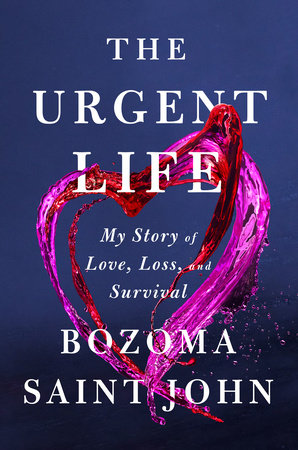The Urgent Life Reader’s Guide
By Bozoma Saint John


1. The book begins with a quote from writer Diane Ackerman: “I don’t want to get to the end of my life and find that I have just lived the length of it. I want to have lived the width of it as well.” What do you think that means? How do the characters in this memoir live the width of their lives? In what ways do you live the length of your life, and in what ways do you live the width?
2. In chapter 1, Bozoma writes that “Peter’s upbringing loomed in stark contrast to mine.” How do their upbringings differ? Despite these contrasts, are there any similarities in how they were raised and in their family dynamics? How has your upbringing shaped who you are today?
3. In chapter 2, Bozoma talks about how she was born into the world carrying all the hopes and dreams of her Ghanaian father. How do her father’s expectations shape who she becomes? In what ways does she push against them and make her own decisions? What parental expectations do you carry, and how do you work with those expectations or against them?
4. In chapter 3, Bozoma describes a health scare she went through at the end of high school. How did that experience define her day-to-day at the time, and how does it shape her life going forward? How do you see her perspective on life and illness change over time? Is there an event in your life that affected you in similar ways?
5. In chapter 4, Bozoma describes the loss of her college boyfriend Ben. Ultimately, she says of the experience, “I would have to learn what I could control, and how to let go of what I could not.” What do you think she learned in losing Ben, and how did that shape her later experiences with loss, particularly her loss of Peter? What have you let go of in your own life?
6. In chapter 5, Bozoma writes of her relationship with Peter, “I was always the impulsive one, lacking in patience. If I had a craving, I wanted to taste it. If I had an idea, I wanted to put it in motion, not tomorrow but right now. . . . But after Peter’s terminal diagnosis, I felt my impatience had to feed a purpose. I needed to slow down, to be thoughtful, because time was running out.” In what ways do you see Bozoma’s mind shift play out over the course of the book? Do you resonate more with Bozoma’s impulsiveness or her slowdown? Why?
7. In chapter 6, soon after Bozoma and Peter get married, her own parents’ marriage falls apart. After that change, how does Bozoma’s view of marriage shift? What shifts have you experienced that have changed your perspective?
8. In chapter 7, Bozoma writes, “When Peter and I first began dating, I used to say I didn’t fall in love with a white man, I just fell in love with Peter. But I did fall in love with a white man and all his white-man things.” What does Bozoma mean by white-man things and how does her awareness of these factors affect her marriage with Peter? What particular things might you contend with because of your identity?
9. In chapter 8, Bozoma talks about the loss of her first pregnancy and becoming pregnant again. How do Bozoma’s and Peter’s roles change during this time?
10. In chapter 9, Bozoma and Peter welcome their daughter Lael, but the cracks in their relationship continue to grow. Bozoma writes, “I was no longer the same person Peter met in a cafeteria ten years before.” How have they each changed since they met? How do these changes contribute to their separation?
11. In chapter 10, Bozoma shares her experience of hearing God’s voice: “‘Dawn always comes,’ it said. ‘And I will always take care of you.’” Going forward, Bozoma decides to welcome dawn instead of fearing it. What do you think that means? How do you see this change in her mindset playing out in her life? When have you been reminded of the coming dawn?
12. In chapter 11, details Peter’s final weeks, when he and Bozoma were back together. What moments of joy and love do Bozoma and Peter manage to create during these heartbreaking weeks? How have they changed since their separation, and in what ways did the break and their present circumstances make their relationship stronger?
13. In chapter 12, Bozoma writes of the time after Peter’s death: “Grief is straightforward. Maybe there is a little anger wrapped up in it, but for the most part, deep, abiding sadness runs along a single, jagged continuum. Relief, however, can encompass a kaleidoscope of emotions.” What do you think she means by this? Do you agree that relief can be more complicated than grief? Why or why not?
14. The title of Bozoma’s memoir is The Urgent Life. What do you think it means to live an urgent life? In what ways does Bozoma’s story exemplify what it means to live an urgent life? How does her notion of an urgent life change over time? What takeaways can you adopt when thinking about your own urgent life?
Just for joining you’ll get personalized recommendations on your dashboard daily and features only for members.
Find Out More Join Now Sign In